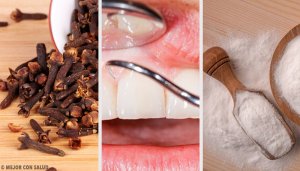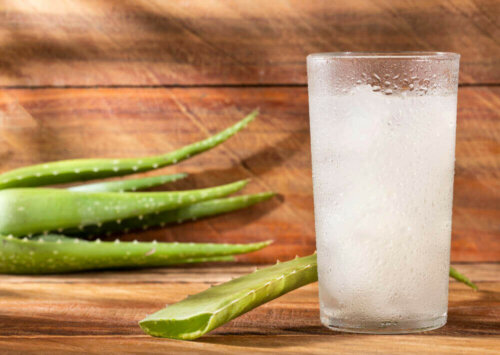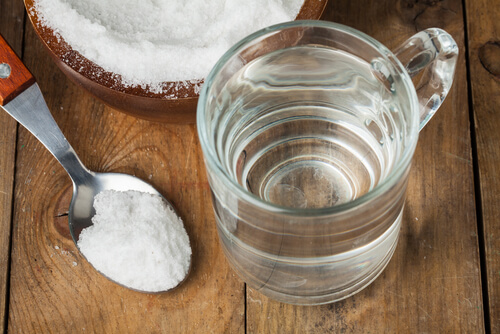Effective Natural Remedies for Gum Disease


Written and verified by the doctor Nelton Abdon Ramos Rojas
Inflamed gums are one of the most common oral diseases a dentist sees. This disease is known as gingivitis. Generally, it’s due to a lack of good oral hygiene and other bad habits.
The bacteria and microbes that normally live in your mouth multiply when you don’t pay enough attention to your oral health. In addition, the inflammation caused by the overpopulation of bacteria destroys the tissues that support your teeth. If it’s not treated in time, this causes your gums to separate from your teeth. This is known as periodontitis.
Inflamed gums cause sensitivity and pain in the area. They become red. Plus, they even bleed a little in most cases. You can get good oral health, and especially healthy gums, if you follow your dentist’s advice.
Remedies for curing inflamed gums
There are many popular natural remedies for inflamed gums. Most of these recipes are based on common ingredients, such as aloe vera and lemon juice, to which various properties are attributed.

While some of these remedies could be potentially effective, there is little or no scientific evidence of the purported benefits and their side effects.
In fact, scientists maintain that more research is needed on the properties of these ingredients in order to know and determine their usefulness in humans.
If you want to try any of these remedies, keep in mind that it’s not proven they’ll eliminate the problem or that, in your case, they’ll provide relief. Therefore, in any case, consider them as a complement to what your doctor prescribes.
Inflamed gums: use aloe vera
Aloe vera is a widely-used plant. Furthermore, people believe it has antifungal, anti-inflammatory, antibacterial, and healing properties. As a result, some people use aloe vera to combat the effects of gingivitis.
In fact, a recent study showed it could provide some relief when used as a mouth rinse, as it contributed to the reduction of inflammation.
If you don’t feel like preparing an aloe vera mouthwash to use after brushing, you can take an aloe stem, peel it and wash it with plenty of water, then put the aloe vera gel directly on the inflamed gums. Remember not to swallow it!
Read more: Top Five Aloe Vera Health Benefits
Cloves
This well-known spice is used to flavor foods. It actually has pain-relieving and antibacterial properties and contains flavonoids. Therefore, it’s considered that it can help relieve pain caused by swollen gums.
Ingredients
- 5 cloves
- 1 c. of water
How do you use it?
Firstly, make a mouthwash by putting the cloves in hot water. Let it cool before using it.
Saltwater

This is a remedy that grandmothers love using for inflamed gums. The belief is that saltwater helps reduce inflammation in your mouth and eliminate harmful bacteria.
To take advantage of it, simply prepare a mixture of water with salt and rinse your mouth for a couple of minutes before and after brushing.
It’s believed that this remedy could be more effective if you use sea salt, however, this isn’t scientifically proven.
How do you use it?
- Firstly, make a mixture of salt and water.
- Then, swish it around in your mouth for a few minutes.
- Afterward, brush your teeth.
Some people believe this remedy is more effective if you use sea salt, but there’s no scientific evidence to support that claim.
Salt and ginger
Another remedy that’s used for treating gum inflammation is ginger. This spicy root has anti-inflammatory and antioxidant properties that can provide some relief from gingivitis.
Ingredients
- 1 small piece of ginger
- A pinch of salt
How do you use it?
- Take a piece of ginger and grind it until you have a smooth paste
- Take the salt, as much as you need, and add a few drops of water to get a paste-like consistency
- Finally, use the mixture you get to massage the inflamed area
Continue reading: The Properties and Uses of Ginger
Other considerations
Inflamed gums injure the tissues around your teeth. They cause bad breath, and, in many cases, tooth loss.
The bleeding that comes from this disease can become a breeding ground for opportunistic microbes and bacteria. They can cause severe infections and spread to other teeth.
There are some medical issues that can make you suffer from inflamed gums. Furthermore, experts have linked this to diseases and malnutrition that can even attack your immune system. These can increase your risk of suffering from this disease.
Because of this, it’s very important to include fiber in your daily diet. You should include cereals and seeds. Some other recommendations are:
- Eat green vegetables like broccoli and asparagus. These are a great source of folic acid and vitamin C.
- Reduce your intake of refined sugar and white flour. This is because these are foods that encourage bacterial growth. These foods also damage your oral health.
- Having braces, retainers or dentures can get in the way of good oral hygiene. It’s important that you take extreme measures and deeply clean your mouth.
Visit your dentist regularly to get a professional cleaning two times per year. Prevention is the key to avoiding this painful problem.
All cited sources were thoroughly reviewed by our team to ensure their quality, reliability, currency, and validity. The bibliography of this article was considered reliable and of academic or scientific accuracy.
- Najeeb S, Zafar MS, Khurshid Z, Zohaib S, Almas K. The Role of Nutrition in Periodontal Health: An Update. Nutrients. 2016;8(9):530. Published 2016 Aug 30. doi:10.3390/nu8090530
- Vázquez, B., Avila, G., Segura, D., & Escalante, B. (1996). Antiinflammatory activity of extracts from Aloe vera gel. Journal of Ethnopharmacology, 55(1), 69–75. https://doi.org/10.1016/S0378-8741(96)01476-6
- Barboza JN, da Silva Maia Bezerra Filho C, Silva RO, Medeiros JVR, de Sousa DP. An Overview on the Anti-inflammatory Potential and Antioxidant Profile of Eugenol. Oxid Med Cell Longev. 2018;2018:3957262. Published 2018 Oct 22. doi:10.1155/2018/3957262
This text is provided for informational purposes only and does not replace consultation with a professional. If in doubt, consult your specialist.








